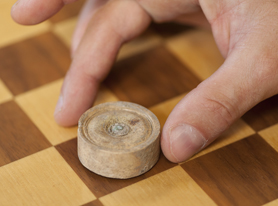Backgammon in the 7th century? Anglo-Saxon royal entertainment uncovered in Kent
Release Date 22 November 2013

University of Reading archaeologists have discovered an ancient and extremely rare Anglo-Saxon board gaming piece while excavating a royal complex at Lyminge, Kent. The piece would have been used for a game similar to that of backgammon or draughts.
The Anglo-Saxon's had a strong tradition of playing board games. Individual gaming pieces, and sometimes complete sets in burials of the period, have been discovered. However not only is the piece the first of this type to be found since the Victorian period, it is the first ever piece to be discovered in a ‘gaming' setting¹, an Anglo-Saxon Royal Hall.
Beautifully crafted from a hollow cylinder of bone, the piece has delicate lathe-turned end caps secured with a central bronze rivet. It is difficult to establish the precise nature of the games played given a lack of contemporary written descriptions, but archaeological evidence from the Germanic continent, the cultural home of the Anglo-Saxons, provides clues.
Both Tabula, a form of backgammon and latrunculi, the aim being to capture the opponent's pieces, can be traced to these regions and were likely transported to England during the fifth century as a consequence of Anglo-Saxon migrations.
Alongside this astonishing discovery, Dr Gabor Thomas and his team have also uncovered items of jewellery, numerous fragments of luxury vessel glass and pits with animal bones, confirming that feasting and social display were integral to Lyminge's role as a place of royal ceremonial events and gatherings during the late 6th and 7th centuries.
Dr Gabor Thomas from the University's Department of Archaeology is leading the Arts and Humanities Research Council funded dig. He said: "Our excavation is providing an unprecedented picture of life in an Anglo-Saxon royal complex. Gaming, along with feasting, drinking, and music, formed one of the key entertainments of the Anglo-Saxon mead-hall as evoked in the poem Beowulf.
"The discovery of Anglo-Saxon gaming-pieces and gaming-boards has previously been restricted to male burials, particularly those of the Anglo-Saxon elite. To find such a well preserved example in the hall, where such board games were actually played, is a wonderfully evocative discovery."
Lyminge's royal complex first emerged in 2012 with the spectacular discovery of an Anglo-Saxon feasting hall, the first such building to be excavated in its entirely in over a generation. This year's dig on an adjacent site also revealed remarkable evidence for the core of the royal complex.
The researchers discovered a sequence of three timber halls, bearing unusual and highly elaborate architectural features. This included mortar and crushed tile floors (opus signinum) previously only seen in the earliest generation of Anglo-Saxon churches, and massive entrance portals on a scale previously unparalleled in Anglo-Saxon England.
Dr Thomas continued: "By combining these fascinating structural remains with a stunning array of artefacts, our excavations are providing new insights into the role played by Anglo-Saxon royal complexes in forging kingdoms and royal dynasties during this key period in English history."
The Lyminge Archaeological Project is funded by the Arts and Humanities Research Council and supported by project partners Kent Archaeological Society and staff from the Canterbury Archaeological Trust. The final year of the dig begins next summer.
ENDS
For media enquiries please contact James Barr at the University of Reading on 0118 378 7115 or j.w.barr@reading.ac.uk
Notes for editors
¹ a piece of this type has previously been attested to only one other Anglo-Saxon site, a ‘princely' barrow burial excavated in Taplow, Bucks in the 1880s.
The University of Reading is ranked among the top 1% of universities in the world (THE World University Rankings 2013) and is one of the UK's top research-intensive universities. The University is ranked in the top 20 for the number of awards it received from research councils for 2010/11.
The University of Reading's Department of Archaeology has an international reputation in research and teaching. The University was awarded the Queen's Anniversary Prize 2009 in recognition of the excellence of the archaeology department, which, uniquely within the study of archaeology, combines ground-breaking research, enterprise and teaching.
The Arts and Humanities Research Council (AHRC) funds world-class, independent researchers in a wide range of subjects: ancient history, modern dance, archaeology, digital content, philosophy, English literature, design, the creative and performing arts, and much more. This financial year the AHRC will spend approximately £98m to fund research and postgraduate training in collaboration with a number of partners. The quality and range of research supported by this investment of public funds not only provides social and cultural benefits but also contributes to the economic success of the UK. www.ahrc.ac.uk